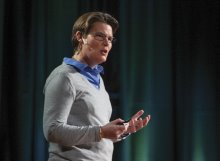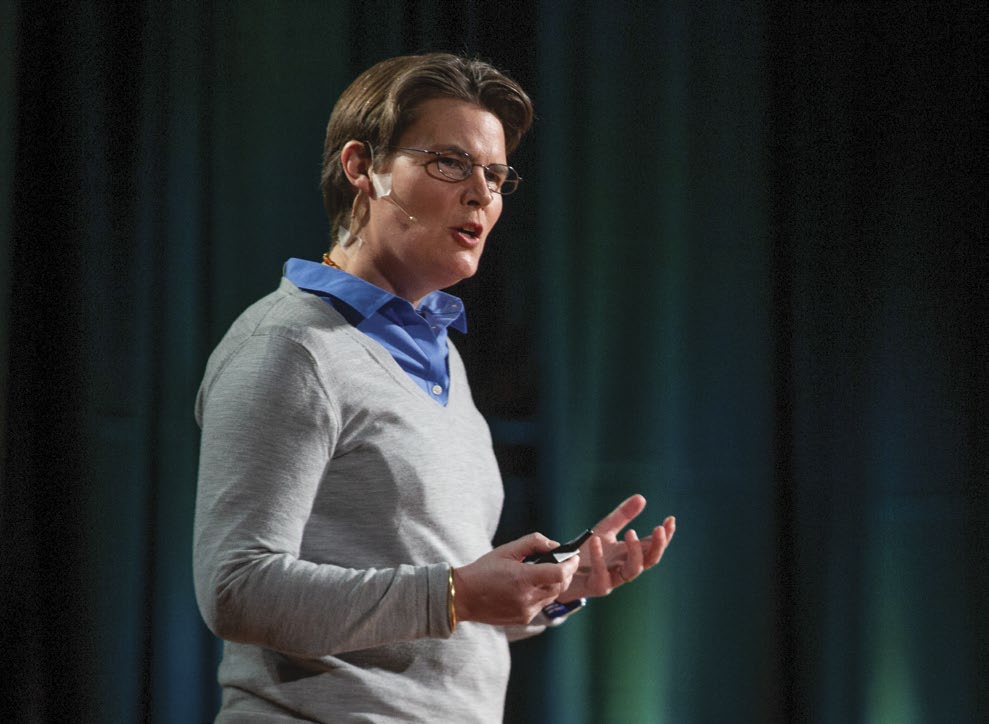
Each week, Dr. Kate Lund ’86 hosts the podcast "The Optimized Mind," diving deeply into stories of resilience. She invites business leaders, personal development coaches, athletes, authors, educators, and influencers across domains on the air to share insights on maximizing potential and seeing possibility on the other side of challenge. For Lund, these conversations are not just interviews, they are examples of the human capacity to overcome obstacles and thrive.
Over her career, Lund, a clinical psychologist, and resilience expert, has worked with countless individuals including parents, athletes, and leaders, helping them overcome obstacles and thrive in their personal and professional lives. She has also consulted for schools, universities, and nonprofits. An early stint in broadcasting during college (she has a great radio voice) has brought her expertise and talents full circle.
“The podcasts are one of my favorite things right now,” says Lund, who started her show in 2021. “I meet all these fascinating people and learn how they’ve worked through challenges in their lives. I absolutely love it. The show is growing, and we will hit 100 episodes in August.”
Some of Lund’s recent memorable podcasts include a conversation with Chuck Garcia, author of The Moment That Defines Your Life: Integrating Emotional Intelligence and Stoicism when your Life, Career, and Family are on the Line, with Nick Karwoski, an entrepreneur and former professional athlete and the iconic sports psychologist Dr. Jim Loehr (see QR Code to listen).
Lund describes resilience as the ability to move through and beyond challenges and to see possibility on the other side of challenge, but she doesn’t stop there. “It’s really being able to manage through and beyond challenge successfully within your own unique context, while integrating the principles of resilience into your day-to-day way of living. The goal is to maximize our potential within our own context and make resilience a lifestyle.”
Lund is also the author of the book Bounce: Help Your Child Build Resilience and Thrive in School, Sports, and Life, which was informed by her observations in her children’s early school years. In the book, she outlines seven pillars of the resilient child: tolerating frustration and managing emotions; navigating friendships and social pressures; sustaining focus on a single task and a larger goal; developing courage; building motivation; building confidence; and creating optimism.
“I wrote a book as a roadmap for parents to help their children build resilience when faced with challenge. A big piece of this is the ability to understand and appreciate individual differences in their children and to help their children do the same, both in themselves and others.”
For most of Lund’s career, she has had an active psychology practice. Over the past several years, her approach has been more eclectic. She is continuing her clinical practice while consulting for companies. Recently, she worked for Parallel Learning, which conducts virtual assessments for students with learning challenges. “I work with parents to help them see beyond test scores and focus on their children’s strengths,” she said.
As part of her work with athletes, she works as the “mindset” person for Boom, a fitness company in Boston, helping athletes maximize their potential and achieve their goals.
In her 2019 TED Talk, Lund traced her journey to the study of psychology back to her childhood. Lund grew up with hydrocephalus, a condition where cerebral spinal fluid does not circulate as it should, causing pressure to build up on the brain. Fortunately, the condition was managed with a shunt, a medical device implanted in the brain.
“My entire Country Day experience incorporated the shunt experience because I was in and out of school a lot for shunt revisions. That was an unusual experience for a kid,” said Lund, who attended GCDS from Pre-K through Grade 9.
She acknowledges that it wasn’t easy. “It was difficult, particularly in fifth grade, coming back after a long absence. But overall, it was a supportive environment even though I was bouncing in and out of the hospital. I got a sense of my own abilities and was able to develop the places where I was strong and work through the places where I wasn’t, and that really stood me in good stead.”
The TED Talk, Lund explains, was built around the idea of finding the ordinary within our particular circumstances. “I really wanted during those years to fit in and be like everybody else. But I had my own unique context. I remind people that they can’t maximize their potential if they are looking outward at others’ accomplishments.”
Unable to play contact sports, Lund found tennis, which became an outlet for her. “At first, I never won. I had my health limitations, but I was happy to be out there. I was playing for the sake of playing. And then the trophies came much later,” says Lund, who went on to play tennis at Greenwich Academy and in college.
Lund’s ties to GCDS run deep. Three of her oldest and closest friends to this day are from Country Day. Lund is grateful to Mr. Bates, a math teacher, who coached tennis. “He gave me the chance to be on the team—that was huge.” Lund remembers that Mr. Griswold was a “fabulous English teacher; I really enjoyed him and his classes.” Mrs. Clarke, a first-grade teacher, was a standout for Lund. “She was a lovely woman and teacher. I remember that classroom well. There was a class dog, and I am, to this day, a huge dog person.”
In recent years, Lund has noticed an uptick in anxiety and underlying unhappiness among parents and children. In her clinical work, she has observed that young people feel a high level of pressure to succeed in certain predetermined ways. This drive for children to succeed is also at the core of parents’ anxiety, explains Lund.
“If young people don’t hit certain marks, they see it as a massive defeat, and it impacts their overall sense of self. It’s very important to help kids recognize early on their own unique potential and to support them in moving toward whatever it is that interests them. They need to think about ‘what do I want and how can I get there?’ Setting goals is an important part of this process for kids, along with recognizing how they can use their strengths to their advantage.”
In response to these issues, Lund has been working with her clients to quiet their minds, to slow down, and find time to step away. She focuses on being optimistic in the face of challenges.
“Human nature leads us to what we didn’t do well. That can really get us trapped in a negative mindset and cycle of negative self-talk. We want to encourage kids and parents to focus on the small wins, focus on the things that did go well on a given day, even if you think you had a horrible day. Challenge is real, and we’re going to face it daily. And we’ve got to be able to balance it with what is going well and the ability to look beyond it.”
Lund sees a role for schools in helping to lessen children’s anxiety by teaching them about emotional intelligence, including qualities like self-awareness, self-regulation, and understanding how their behavior impacts others, starting as early as Nursery.
“I strongly believe that schools should prioritize emotional intelligence, alongside academic achievement, to create a balanced education. EQ is increasingly one of the key qualities employers seek,” said Lund based on her experience working with business leaders.
Lund’s most important piece of advice for parents is: “Never lose sight of the possibilities for your kids. Don’t be afraid to help them pivot and redefine themselves. We don’t want parents or kids to define themselves based on external achievement. We want to help kids believe in themselves from the inside out.”
When not working, Lund enjoys time with her husband, twin boys and two dogs. She recently trained one of the family dogs, Wally, a two-year old Brittany Doodle as a therapy dog. The two visit Seattle Children’s Hospital twice a month. “It makes me happy to know that Wally and I can bring a bit of joy to the kids and families we visit.”
#nccsalumni











.JPG&command_2=resize&height_2=85)





.jpg&command_2=resize&height_2=85)




